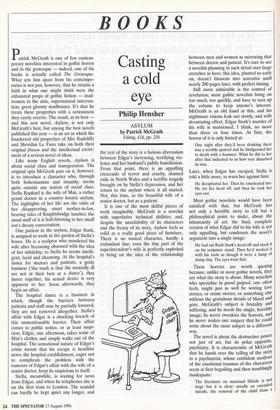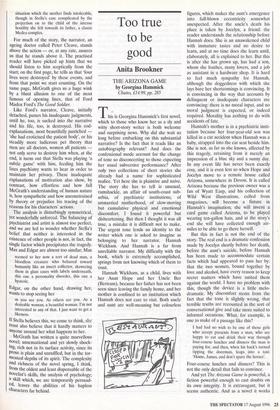BOOKS
Casting a cold eye
Philip Hensher
ASYLUM by Patrick McGrath Viking, L76, pp. 256
Patrick McGrath is one of few contem- porary novelists interested in gothic horror and in the grotesque — indeed, one of his books is actually called The Grotesque. What sets him apart from his contempo- raries is not just, however, that he retains a faith in what one might think were the exhausted props of gothic fiction — mad- women in the attic, supernatural interven- tion, great gloomy madhouses. It's that he treats these properties with a seriousness they rarely receive. The result, at its best and this new novel, Asylum, is not only McGrath's best, but among the best novels published this year — is an art in which the knackered old properties of Mrs Radcliffe and Sheridan Le Fanu take on both their original frisson and the intellectual excite- ment of a serious novel of ideas.
Like many English novels, Asylum is about social class and transgression. The original spin McGrath puts on it, however, is to introduce a character who, through both bohemianism and insanity, seems quite outside any notion of social class. Stella Raphael is the wife of Max, a rather grand doctor in a country lunatic asylum. The highlights of her life are the visits of her disapproving, smart mother-in-law, bearing tales of Knightsbridge lunches; the usual stuff of it is half-listening to her small son's dreary conversation.
One patient in the asylum, Edgar Stark, is assigned to work in the garden of Stella's house. He is a sculptor who murdered his wife after becoming obsessed with the idea of her infidelity; to Stella he seems intelli- gent, lucid and charming. At the hospital's dance for doctors and patients, a grisly business (`the truth is that the mentally ill are not at their best at a dance'), they dance together; his sexual desire is very apparent to her. Soon afterwards, they begin an affair.
The hospital dance is a business in which, though the barriers between patients and staff may be partially lowered, they are not removed altogether. Stella's affair with Edgar is a shocking breach of this unmentionable barrier. Their affair comes to public notice, or at least suspi- cion; Edgar, one afternoon, takes some of Max's clothes and simply walks out of the hospital. The sensational nature of Edgar's crime means that his escape is headline news; the hospital establishment, eager not to complicate the problem with the rumours of Edgar's affair with the wife of a senior doctor, keep its suspicions to itself.
Stella, meanwhile, is waiting for news from Edgar, and when he telephones she is on the first train to London. The scandal can hardly be kept quiet any longer, and the rest of the story is a furious alternation between Edgar's increasing, terrifying vio- lence and her husband's public humiliation. From that point, there is an appalling crescendo of terror and cruelty, shamed exile in North Wales and a terrible tragedy brought on by Stella's depression, and her return to the asylum where it all started. Not, this time, as the beautiful wife of a senior doctor, but as a patient.
It is one of the most skilful pieces of work imaginable. McGrath is a novelist with superlative technical abilities, and, despite the unreliability of its characters and the frenzy of its story, Asylum feels as solid as a really good piece of furniture. There is no wasted character, hardly a redundant line; even the tiny part of the superintendent's wife is perfectly exploited to bring on the idea of the relationship One night after they'd been drinking there was a terrible quarrel and he bludgeoned her to death with a hammer. What he did to her after that indicated to us how very disturbed he was.
Later, when Edgar has escaped, Stella is told a little more, to warn her against him:
He decapitated her. Then he enucleated her. He cut her head off, and then he took her eyes out.
Most gothic novelists would have been satisfied with that, but McGrath has not only a horrible story to tell but a philosophical point to make, about the inhumanity of art; the final, complete version of what Edgar did to his wife is not only appalling, but condenses the novel's argument into a single image:
He had cut Ruth Stark's head off and stuck it on his sculpture stand. Then he'd worked it with his tools as though it were a lump of damp clay. The eyes went first.
These horrors are worth quoting because, unlike in most gothic novels, they are what the story is about. Many novelists who specialise in grand guignol, one often feels, might just as well be writing love stories, or crime stories, or something else without the gratuitous details of blood and gore. McGrath's subject is brutality and suffering, and he needs the single, horrible image; he never overdoes the horrors, and he never makes one suspect that he could write about the same subject in a different way.
The novel is about the destructive power not just of art, but its polar opposite, psychiatry. It is characteristic of McGrath that he hands over the telling of the story to a psychiatrist, whose confident analyses of the emotional traumas of the characters seem at first beguiling and then troublingly inadequate: The literature on maternal filicide is 'not large but it is clear: usually an extended suicide, the removal of the child from a
between men and women as mirroring that between doctor and patient. It's rare to see a novelist planning in such detail over large stretches as here; this idea, planted so early on, doesn't blossom into narrative until nearly 200 pages later, with perfect timing. situation which the mother finds intolerable, though in Stella's case complicated by the projection on to the child of the intense hostility she felt towards its father, a classic Medea complex.
For much of the story, the narrator, an ageing doctor called Peter Cleave, stands above the action — or, at any rate, assures us that he stands above it. The practised reader will have picked up hints that we should listen to him sceptically from the start; on the first page, he tells us that 'four lives were destroyed' by these events, and from that point we start counting. On the same page, McGrath gives us a huge wink by a blunt allusion to one of the most famous of opening lines, that of Ford Madox Ford's The Good Soldier.
Like Ford's narrator, Cleave, initially detached, passes his inadequate judgments, until he, too, is sucked into the narrative and his life, too, is destroyed. His cod- explanations, most beautifully pastiched `she had eroticised the patient body', or his steadily more ludicrous pet theory that men are all doctors, women all patients not only serve to destroy him when, at the end, it turns out that Stella was playing 'a subtle game' with him, feeding him the lines psychiatry wants to hear in order to maintain her privacy. These inadequate explanations of motivation also show, by contrast, how effortless and how full McGrath's understanding of human nature is, how sympathetic and how unconstrained by theory or prejudice his tracing of the reasons for his characters' actions.
The analysis is disturbingly symmetrical, yet wonderfully unforced. The balancing of psychiatrist and artist is almost too perfect, and we are led to wonder whether Stella's belief that neither is interested in the existence of other people is not, in fact, the single factor which precipitates the tragedy. Max and Edgar are almost too similar; Max seemed to her now a sort of dead man, a bloodless creature who behaved toward humanity like an insect collector, skewering them in glass cases with labels underneath, this one a personality disorder, this one a hysteric.
Edgar, on the other hand, drawing her, wants to stop seeing her
as you see you. As others see you. As a desirable woman, a beautiful woman. I'm not interested in any of that. I just want to get a likeness.
If Stella believes this, we come to think, she must also believe that it hardly matters to anyone around her what happens to her. McGrath has written a quite marvellous novel; unsensational and yet slowly shock- ing, rich not in its surface activity, since its prose is plain and unruffled, but in the tor- mented depths of its spirit. The complexity and richness of the novel spring, I think, from the oldest and least dispensable of the novelist's skills, the analysis of psychology; a skill which, we are temporarily persuad- ed, leaves the abilities of his hapless characters far behind.



















































 Previous page
Previous page